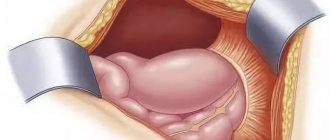Stomach fullness
I ate a little, but I felt like I had eaten too much, my stomach was full, I felt heaviness, fullness, distension, bloating.
What could it be? You’ve eaten a little, but you feel like you’ve eaten too much, your stomach is full, you feel heaviness, fullness, distension, bloating. What could it be? What are the reasons for this condition? Why is there a constant feeling of a full stomach, even when I haven’t eaten? What to do? How to treat? Unfortunately, people ask themselves these and similar questions already too late. Stop, listen to what your body wants to say. Perhaps this will save you from serious consequences.
The feeling of a full stomach is a gastrointestinal alarm signal. There are a wide variety of pathological conditions that can cause a feeling of a full stomach. The most common reasons include increased gas formation in the intestines, dysbiosis, excessive swallowing of air and impaired digestion of food.
Causes of feeling of a full stomach
The emergence of a feeling of early satiety, fullness, distension of the epigastric region, as a result of minor disorders of the digestive system:
- Lactose intolerance is when the digestive tract cannot digest lactose. The older a person is, the less enzymes are secreted that can digest lactose. Sugar does not break down and begins to ferment, releasing gases. These are the causes of bloating.
- Food allergy is a condition in which the human body does not accept certain foods. In this case, consultation with a nutritionist is mandatory.
- A state of rapid satiety and a feeling of a full stomach can occur in heavy smokers. The gastric mucosa is irritated by nicotine and ceases to fully perform its functions.
- A pregnant woman also complains of feeling similar symptoms. The acidity of gastric juice, as a rule, increases, hence nausea and a feeling of heaviness in the stomach, fullness in the abdomen.
- Functional indigestion, functional dyspepsia, or irritable bowel syndrome is a set of symptoms that includes pain and discomfort in the stomach. A person feels heaviness, pain, the stomach seems to be bursting, there is a feeling of fullness in the abdomen, vomiting, belching. Functional dyspepsia is typical for patients with impaired motility and hypersensitivity of gastric receptors to stretching. The reasons for this condition are stress and serious psychological experiences. Relieving the patient's mental state is the best treatment in this situation.
A feeling of fullness in the epigastric region may be a consequence of serious illnesses. Heaviness in the stomach, combined with bloating and increased gas formation, may indicate the presence of serious diseases: gastritis, ulcers, pancreatitis and malignant neoplasms.
Feeling of fullness in the stomach
For reference. The size of the stomach in an adult is constantly changing depending on food intake and other conditions. Normally, the length of the organ is 24-26 cm, the distance between the lesser and greater curvature is 10-12 cm, the anterior and posterior walls are located at a distance of 8-9 cm from each other. On an empty stomach, the stomach is 18-20 cm long, and its walls are practically touch. The volume of an empty organ is 500 ml, after a meal – 1 liter.
The maximum capacity of the stomach is up to 4 liters. A similar volume is detected in people with frequent overeating. Also, the size and volume of the stomach depend on the amount of gastric juice. Women produce from 70 to 80 ml of juice, and men up to 100 ml with each meal, therefore, in males, the volume of the organ is larger.
Causes of stomach fullness
The emergence of a feeling of early satiety, fullness, distension of the epigastric region, as a result of minor disorders of the digestive system:
The maximum capacity of the stomach is up to 4 liters.
Milk sugar intolerance, when the digestive tract does not digest lactose. The older a person is, the less enzymes are secreted that can digest lactose. Sugar does not break down and begins to ferment, releasing gases. These are the causes of bloating.- Food allergy is a condition in which the human body does not accept certain foods . In this case, consultation with a nutritionist is mandatory.
- A state of rapid satiety and a feeling of a full stomach can occur in heavy smokers . The gastric mucosa is irritated by nicotine and ceases to fully perform its functions.
- A pregnant woman also complains of feeling similar symptoms. The acidity of gastric juice, as a rule, increases, hence nausea and a feeling of heaviness in the stomach, fullness in the abdomen.
- Functional indigestion, functional dyspepsia, or irritable bowel syndrome is a set of symptoms that includes pain and discomfort in the stomach. A person feels heaviness, pain, the stomach seems to be bursting, there is a feeling of fullness in the abdomen, vomiting, belching. Functional dyspepsia is typical for patients with impaired motility and hypersensitivity of gastric receptors to stretching. The reasons for this condition are stress and serious psychological experiences. Relieving the patient's mental state is the best treatment in this situation.
A feeling of fullness in the epigastric region may be a consequence of serious illnesses. Heaviness in the stomach, combined with bloating and increased gas formation, may indicate the presence of serious diseases: gastritis, ulcers, pancreatitis and malignant neoplasms.
Diseases accompanied by dyspepsia
In about half of the patients, organic dyspepsia is often associated with peptic ulcers, GERD (gastroesophageal reflux disease), and less commonly with pancreatitis, cholelithiasis, cholecystitis, and tumors of the stomach and pancreas.
Organic dyspepsia (caused by a disease) differs from functional dyspepsia by the presence of: seasonal pain (exacerbations more often in spring and autumn), the appearance of night pain that is relieved by eating, intense heartburn (more than 2 times a week), weight loss, the presence of pathological changes in diagnostic data.
Functional dyspepsia (“they ate something wrong”) is characterized by many complaints with a generally satisfactory condition and a long, favorable course of the disease without progression.
The following factors play a role in the occurrence of functional dyspepsia:
1. Emotional stress, mental trauma, depression, stress. 2. Dietary disorder: irregular food intake, overeating, “snacking” at night. 3. Smoking, drinking alcoholic beverages. 4. Infection of the gastric mucosa with the bacterium H. pylori. 5. Impact of environmental factors: high air temperature, high atmospheric pressure, vibration.
The leading mechanism for the development of dyspepsia is a violation of the nervous regulation of the motor function of the stomach and duodenum.
Manifests: reflux of duodenal contents into the stomach, slower gastric emptying, impaired gastroduodenal coordination, decreased sensitivity of the gastric mucosa to distension.
Feeling of fullness in the stomach without food: what pathologies may be
A feeling of fullness in the stomach can be a symptom of the following pathologies:
- Inflammatory diseases. Bacteria, viruses and autoimmune processes can damage the walls of the digestive tract and disrupt the functioning of the gastrointestinal tract. Such diseases include ulcerative colitis, celiac disease, gastritis and gastroduodenitis. Dyspeptic disorders often cause bloating.
- Fluid retention. Normally, the body constantly eliminates excess fluid through urine. Various disorders can cause fluid retention in the abdominal cavity. These may be liver pathologies and oncological processes.
- Constipation. The large intestine produces feces and removes them from the body within 24 hours. Retention of feces in the intestinal lumen may be associated with impaired motor activity of the intestinal walls and lack of fluid. The accumulation of stool in the intestines also leads to an increase in the amount of gas due to obstruction.
- Food intolerance. Individual metabolic characteristics can cause intolerance to various foods. Intolerance is not an allergic reaction, since this process is associated with impaired absorption of the nutritional component. The most common conditions are gluten and lactose intolerance. In people with this disease, consuming an indigestible product leads to bloating, diarrhea and vomiting.
- Intestinal bacterial overgrowth syndrome . This disease is associated with an imbalance of intestinal bacterial colonies. The cause may be a pathology of the intestinal structure or the proliferation of pathogenic microorganisms. Harmful bacterial colonies produce gas and toxic substances. Characteristic symptoms of the disease include bloating and diarrhea.
- Infection . Bacteria, viruses, fungi and protozoa can damage the cells of the digestive tract and cause various pathologies. In this case, the feeling of bloating may be associated with fluid retention and an increase in the number of white blood cells.
- Intestinal obstruction . If constipation causes temporary and incomplete intestinal obstruction, the obstruction completely blocks the organ. The intestinal lumen may be blocked by scar tissue or tumor. Unlike constipation, obstruction is accompanied by pain, loss of appetite and other dangerous symptoms.
- Stress. A person’s emotions can affect the functioning of the gastrointestinal tract and cause a feeling of a full stomach. Stress usually causes spasms and impaired intestinal motility.
Such a variety of causes can complicate diagnostic measures. As a rule, doctors look for other characteristic signs of diseases.
Common causes of dyspepsia:
— Hasty food. Digestive juices do not have time to be released. Food is poorly chewed and therefore does not mix well with the digestive enzymes of saliva.
- Binge eating.
— Certain products.
- Drinking certain drinks. Carbon dioxide and sugar in them can cause bloating and flatulence. Caffeine increases stomach acidity and irritates inflamed areas (alcohol also has an effect), and in addition, stimulates the release of stress hormones.
- Stress. They impair digestion because they are associated with the release of hormones (in particular, adrenaline and cortisone), which redistribute blood flow from the digestive tract to the muscles. Stress also promotes swallowing air while eating (aerophagia).
- Physical activity soon after eating. It redistributes blood flow from the digestive tract to the muscles.
— Taking non-steroidal anti-inflammatory drugs.
Feeling of fullness in the stomach without eating
The feeling of a full stomach without food is quite common.
Therefore, the causes are divided into several large groups. The feeling of fullness in the stomach without food is quite common. Therefore, the causes of occurrence are divided into several large groups. The first group of factors, namely the severity of the stomach after eating, includes:
- poor nutrition. Quick snacks on the go or foods enriched with a lot of fat or hot spices;
- overeating, especially a few hours before bedtime. This may cause a person to feel very heavy in the morning;
- Irrational diet, when a person eats one or two times a day . Normally, you need to eat small portions, preferably six times a day;
- eating a large number of dishes at one meal;
- dishes consisting of incompatible or long-digesting foods.
Increased feeling of hunger
Diabetes
Thyrotoxicosis
12642 August 25
IMPORTANT!
The information in this section cannot be used for self-diagnosis and self-treatment.
In case of pain or other exacerbation of the disease, diagnostic tests should be prescribed only by the attending physician. To make a diagnosis and properly prescribe treatment, you should contact your doctor. The feeling of hunger is an expression of the body's need for nutrients. The formation of feelings of hunger occurs due to the mechanisms of hormonal and neuro-reflex regulation. The food center is a complex complex, the central link of which is the nuclei of the hypothalamus, located in the diencephalon. When these nuclei are irritated, a feeling of hunger occurs, and when they are destroyed, a refusal to eat occurs.
Types of increased hunger
An increased feeling of hunger may occur for natural reasons, or may not correspond to objective indicators of satiety.
Hunger, like any feeling, is subjective.
True hunger
is caused by a lack of nutrients (glucose, amino acids, fats) and occurs with prolonged emotional stress and intense exercise.
However, modern man suffers much more often from false, psychological hunger
.
Psychological hunger has as many varieties as human habits. For example, having gotten used to eating at a certain time, a person consumes food regardless of the presence or absence of true hunger. The same applies to the habit of eating while watching TV or reading. The need for rest after hard work sometimes makes a person think about food. Boredom or, conversely, the desire to have a holiday - all this is realized through the feeling of hunger. However, there is also constant pathological hunger
caused by an imbalance of hormones or a violation of neuro-reflex regulation due to certain diseases.
Possible causes of increased hunger
The reasons for the constant feeling of hunger may be due to the lack of substances in the blood that have an inhibitory effect on the food center, for example, glucose. For diabetes
due to a lack of insulin or tissue resistance to this hormone, glucose cannot enter the cells. Lack of glucose in cells causes excitement in the food center and a feeling of hunger. However, eating a new portion of food when insulin levels are low does not lead to satiety.
At the same time, obesity develops, which increases insulin resistance and aggravates the disease.
With
thyrotoxicosis,
increased metabolic processes lead to muscle atrophy, causing weakness and increased sweating.
Trying to satisfy their increased appetite, patients with thyrotoxicosis eat a lot, but do not gain weight, but rather lose weight.
Due to the activation of peristalsis, defecation becomes more frequent. Hormonal shifts lead to the development of neurasthenia and irritability. A characteristic symptom of thyrotoxicosis is tremor of the limbs, which manifests itself at rest and during movement.
Another example of an increase in hunger due to hormonal changes is increased appetite during pregnancy.
. Pregnancy causes an increase in the concentration of estrogen in the blood, which, reaching the pituitary gland, triggers the production of prolactin.
This hormone promotes appetite growth and leads to the replacement of adipose tissue of the mammary glands with glandular tissue.
After childbirth, prolactin interferes with the secretion of progesterone, which prevents another pregnancy.
Increased secretion of prolactin occurs with the growth of prolactinoma
, a benign tumor of the pituitary gland, as well as in response to taking
antipsychotics, antiemetics, and hormonal contraceptives
.
Another hormone that causes hunger is ghrelin
, which is produced by ghrelin-producing cells in the stomach. Entering the blood, it affects the food center of the brain, inducing hunger. This hormone also has a stimulating effect on gastric motility and peristalsis. As body weight decreases, ghrelin secretion increases. Stretching of the stomach walls after eating leads to a decrease in ghrelin secretion. This hormone has an antagonist, leptin, which affects fat metabolism and suppresses appetite. With low leptin levels, morbid obesity develops in the presence of a number of genetic diseases.
Obese patients are characterized by high concentrations of leptin in the blood. But the cells become resistant to this hormone, and the feeling of hunger does not go away.
At night, leptin secretion increases, which allows a person to sleep without feeling hungry.
The feeling of hunger can be triggered by increased acidity of gastric juice. An acidic environment is necessary to denature large protein molecules, ensure the functioning of gastric juice enzymes, and neutralize pathogenic microorganisms that enter the body with food. However, when acid affects the esophagus, the fornix of the stomach and the anterior wall of the duodenum, where there should be a neutral environment, heartburn and hunger occur. Eating suppresses this condition, but after a while the unpleasant sensations resume. With prolonged exposure to hydrochloric acid on the gastric mucosa, erosions are first formed, which, if left untreated, develop into an ulcer.
With increased acidity of the stomach, the patient experiences, in addition to heartburn, aching pain in the epigastric region and sour belching.
In addition to hormonal and secretory reasons, increased feelings of hunger are caused by neuropsychiatric diseases.
For example, patients with Parkinson's disease
lack control over food intake. They often eat at night, consuming significantly more than their needs.
Bulimia, an eating disorder, is widespread among adolescents and young girls. It is caused by a pathological fear of obesity and is accompanied by constant thoughts about food.
Patients with bulimia cannot stop themselves from overeating and consume excessive amounts of food.
After an episode of overeating, they either induce vomiting or take laxatives and diuretics.
Causes of increased hunger include the effects of low-energy diets
. Lack of food is accompanied by a decrease in blood glucose levels, which causes a feeling of hunger.
With a rational and long-term refusal of high-carbohydrate foods, the body changes metabolic processes, switching to energy sources such as fats and hard-to-digest carbohydrates. With intermittent dieting, the body experiences metabolic stress. Nutrients accumulate for future use, and in the absence of a diet, the body requires more calories than necessary, which is accompanied by a constant feeling of hunger.
Which doctors should I contact?
If hunger occurs soon after eating, you need to find out its cause. You should first visit to make a diagnosis. In case of hormonal imbalances or pregnancy, the therapist will refer the patient to a gynecologist-endocrinologist. If you suspect gastrointestinal disorders, you should contact. If psychological or neurological problems are identified, consultation with a neuropsychiatrist or. Hunger, as a diet companion, is almost inevitable. However, it is advisable to regulate body weight based on the recommendations of a nutritionist.
Diagnostics and examinations
An increased and constant feeling of hunger can serve as a symptom of disease. Therefore, you should definitely take a general urine and blood test.
A feeling of fullness in the stomach as a symptom of gastritis
Gastritis - the inner walls of the stomach become inflamed due to improper, poor-quality nutrition, infection with microorganisms, dysfunction of hydrochloric acid secretions. Symptoms of gastritis:
- heaviness in the stomach;
- nausea after eating;
- vomit;
- belching;
- pain in the epigastric region.
Ulcer – wounds form on the walls of the stomach. The symptoms of the disease are the same as for gastritis. However, an ulcer is a more dangerous disease due to complications: bleeding, when the wound becomes through.
Heaviness in the abdomen due to gastritis or ulcers
Gastritis - the inner walls of the stomach become inflamed due to improper, poor-quality nutrition, infection with microorganisms, dysfunction of hydrochloric acid secretions. Symptoms of gastritis:
- heaviness in the stomach;
- nausea after eating;
- vomit;
- belching;
- pain in the epigastric region.
Ulcer – wounds form on the walls of the stomach. The symptoms of the disease are the same as for gastritis. However, an ulcer is a more dangerous disease due to complications: bleeding, when the wound becomes through.
Feeling of fullness in the stomach on an empty stomach
Reasons for a full stomach on an empty stomach:
- independent treatment of diseases with drugs that affect the functioning of the gastrointestinal tract;
- addiction to alcoholic beverages and smoking;
- drinking sugary carbonated drinks in large quantities;
- dysfunction of organs such as the stomach, pancreas, duodenum and liver;
- constant influence of stressful situations.
A separate reason for the appearance of an uncomfortable feeling in the stomach can be considered the period when a woman is carrying a child. Heaviness in the stomach during pregnancy is not normal, but still common. It can occur at any time due to various influence factors. Most often this is explained by reduced immunity, as well as the fact that during such a period many changes occur, affecting almost all internal organs. In addition, the child himself puts pressure on the stomach, and this, in turn, causes constant heartburn and heaviness.
In addition to these reasons, severity can be caused by a number of certain diseases, including:
- chronic gastritis;
- peptic ulcer;
- pyloric stenosis - with this disorder there is a narrowing of the exiting section of this organ;
- oncological neoplasms;
- chronic pancreatitis;
- cholelithiasis;
- hepatitis of viral origin;
- Cirrhosis of the liver as a result of drinking large quantities of alcohol.
- effects on the stomach of infectious diseases.
Feeling of constant fullness in the stomach: treatment
Treatment of heaviness in the stomach should be carried out only as prescribed by a gastroenterologist and in no case should you do it yourself.
Treatment of heaviness in the stomach should be carried out only as prescribed by a gastroenterologist and in no case should you do it yourself. Many doctors often hear from their patients the question of how to get rid of heaviness in the stomach. The first step is to normalize your diet. It is best to give up fried and spicy foods, on-the-go snacks and fast food, and drink less alcoholic and carbonated drinks. Try not to overeat before bed and learn not to take stressful situations seriously.
If such treatment measures do not produce results, then it is necessary to treat with medications and tablets prescribed for each patient individually, based on the causes of occurrence.
It is worth noting that not all tablets can be taken by pregnant women and children, so before treatment you should consult a gastroenterologist. Very often, all symptoms of heaviness in the stomach during pregnancy disappear some time after childbirth.
You can treat heaviness in the stomach using folk remedies, but only after the permission of the attending physician. Such techniques include recipes that must be made from:
- calendula, St. John's wort and yarrow;
- medicinal chamomile, especially in combination with herbs such as tansy or yarrow;
- baking soda and lemon juice;
- wormwood and honey.
Women during pregnancy and young children should refrain from such therapy.
Sources
https://limto.ru/utrom-oshhushhenie-polnogo-zheludka/
https://shokomania.ru/chuvstvo-polnogo-zheludka-postojanno/
https://pishado. ru/oshhushhenie-polnogo-zhivota-zabolevaniya-i-patologii-drugie-prichiny.html
https://www.yandex.ru/turbo?text=https%3A%2F%2Fbugmk.ru%2Fvzdutie%2Fchuvstvo-polnogo-zheludka-prichiny.html











